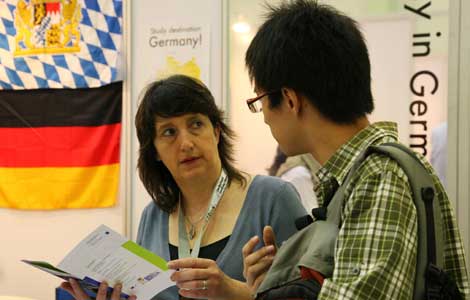Society
A degree of separation
Updated: 2011-08-08 08:03
By Jaroslaw Grzegorzek (China Daily)
|
A youngster is attracted by the Germany booth at an international education fair in Beijing. Yong Kai / Asia News Photo |

Since the United Kingdom is raising tuition fees even further, Chinese students are looking to other, cheaper, European countries for their education. Jaroslaw Grzegorzek reports.
Deng Xinpei says that having 20 family members and friends wave goodbye at Guangzhou Airport made her feel good. She also says she knows her father regretted that her boarding pass did not say London. Instead, her destination was Krakow, Poland.
"People ask whether it is cold out here," says Deng, 22, who now studies business in Nowy Sacz, southern Poland, two hours drive from Krakow.
Deng's first choice for overseas studies was the United Kingdom, the most popular destination for Chinese students going to Europe. But with that government voting to lift a cap on tuition fees for Europeans starting in 2012 - which will triple costs for many students - there will be a shift to more wallet-friendly countries on the continent.
That means that Chinese students in the UK - more than 100,000 as of 2010, and other internationals - are expected to fill the revenue gap even though they already pay about triple the fees of locals.
Deng, whose family is middle-class, was forced to change her choice of university to Poland where the cost is about one-third compared to what it would be in the UK.
"In Poland you need only 70,000-80,000 yuan ($10,870-12,420) a year to survive," she says.
"International fees are not governed by UK legislation," says Vincenzo Raimo, director of the international office at the University of Nottingham, with a sister campus in Ningbo, China.
"There is no limit that a university can charge."
International fees are set individually and students do not sign contracts of the price guarantee. Raimo, whose university makes a public commitment to fixed fees, says "not all universities share this policy".
At least 90 percent of Chinese studying abroad are family-funded rather than government-backed, says a report on the Development of Chinese Overseas Educated Talents 2009 by the Center for China and Globalization, an independent, non-profit think tank based in Beijing.
"There have been a lot of changes to higher education recently," says Sally Scott, from Universities UK, associating and representing 133 institutions. Universities UK conducted a survey that wasn't widely publicized, stating that international fees have risen by up to 50 percent over the past decade, the Immigration Matters website reported in 2010.
Bristol University and some other universities in the UK have recently announced on their websites that fees will be raised along with inflation each year.
"The British press needs accuracy and clarification," says Shi Anbin, deputy dean of School of Journalism and Communication at Tsinghua University. The UK media often do not distinguish between European and international fees, which makes it confusing, he says.
The UK will likely feel competition from countries like Poland, where universities will put in extra efforts at recruiting because of emptying classrooms. Demographic depression will lower the number of university students by 40 percent in 2020, or 1.2 million, according to Demographic Tsunami, a report on intellectual capital.
"Recruiting Chinese is currently crucial as development trends of the Chinese economy show its growing importance in the world," says Krzysztof Pawlowski, a former politician and the rector of WSB-NLU, Poland, which has recruited from 34 countries since 2002. "Chinese not only bring money but also added value."
He says that not only budget concerns drive Chinese to Poland but also its unique geopolitical location.
"Poles understand culture, social and business conditions in places like Russia, Ukraine and Belarus, which will become important areas for future international investments by Chinese," Pawlowski says.
At The University of Warsaw, Poland's second best school according to QS World University Rankings, a master of arts in international business is offered to non-Europeans for $5,755. At the University of Sheffield in the UK, with the largest population of Chinese students, the same degree costs $23,025, about four times more. A bachelor of arts in architecture is seven times higher.
University of Bedfordshire in Bedford, 75 km north of London, offers bedrooms accompanied with bathroom and shared kitchen for 350-400 pounds ($574-655) a month. In Nowy Sacz, where Deng studies, with the same population as Bedford of approximately 85,000, the price is a quarter of that.
Michal Klocek, a consultant from Krakow, Poland's third most expensive city in 2010 going by housing prices, visited London on a business trip and spent 15 pounds ($25) on a fish-and-chips lunch. For the same amount two people could buy a two-course traditional Polish lunch in downtown Krakow.
"For Chinese parents, knowledge is power," Deng says.
Holding a university degree will make it easier to find a job and support her no-pension-scheme family, who spent their life savings on her education. Some families have to sell their cars or houses to let their children study abroad, she says.
"That will be a big shame for my family. After spending so much money and time, if I did not have a diploma," says Deng, adding that politicians in the UK should be punished "for making their decision to raise tuition fees".
E-paper

My Chinese Valentine
Local businesses are cashing in on a traditional love story involving a cow herder and a goddess
Outdoor success
Lifting the veil
Allure of mystery
Specials

Sowing the seeds of doubt
The presence in China of multinationals such as Monsanto and Pioneer is sparking controversy

Lifting the veil
Beijing's Palace Museum, also known as the Forbidden City, is steeped in history, dreams and tears, which are perfectly reflected in design.

Beer we go
Early numbers not so robust for Beijing's first international beer festival

